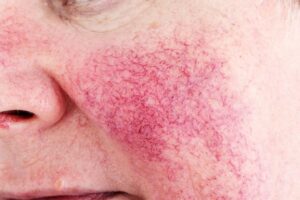Alcohol has long been a part of social gatherings and celebrations, often enjoyed in moderation. However, excessive alcohol consumption can take a toll on various aspects of our health, including the well-being of our skin. The effects of alcoholism on facial skin health are often overlooked, but they can be significant and distressing. In this article, we delve into the lesser-known consequences of alcoholism on the skin, exploring how excessive drinking can lead to issues such as redness, inflammation, and premature aging.
The Link Between Alcoholism and Skin Health
Alcohol is known to impact our bodies in multiple ways, and the skin is no exception. The skin serves as a reflection of our overall health, and when alcoholism becomes a part of our lifestyle, its negative effects become evident on our faces. One of the key factors contributing to skin problems is the dehydrating nature of alcohol. Excessive alcohol consumption can lead to dehydration, robbing the skin of its natural moisture and leaving it dry and prone to damage.
Taking Control: Women’s Sober Living and M365
Recognizing the toll that excessive alcohol consumption takes on skin health is the first step toward change. For women seeking recovery and a healthier lifestyle, women’s sober living programs offer a supportive environment to overcome addiction and regain control of their lives. The journey to better skin health begins with sobriety and self-care.
M365, a wellness program dedicated to holistic health, can play a significant role in restoring skin health after alcoholism. Emphasizing nutrition, exercise, and mental well-being, M365 provides individuals in recovery with a comprehensive approach to regaining their skin’s vitality and radiance. By focusing on these aspects, individuals can rebuild their skin’s resilience and natural beauty.
Redness and Inflammation
One of the immediate effects of alcohol consumption is the dilation of blood vessels, leading to a flushed appearance. This redness is often accompanied by inflammation, giving the skin a puffy and swollen look. Over time, persistent alcohol consumption can lead to the development of more chronic skin conditions such as rosacea. The dilation of blood vessels can become permanent, causing a noticeable redness that’s difficult to hide.
Premature Aging
Perhaps one of the most concerning effects of alcoholism on skin health is premature aging. Alcohol accelerates the aging process by impairing the body’s production of collagen and elastin, essential components that maintain skin elasticity and firmness. This can result in the formation of fine lines, wrinkles, and sagging skin. Premature aging caused by alcoholism can make individuals appear older than their actual age, affecting their self-esteem and confidence.
Impact on Skin Nutrition and Healing
Alcoholism interferes with the body’s ability to absorb essential nutrients, including those vital for skin health. Deficiencies in vitamins like vitamin A, vitamin C, and vitamin E can impair the skin’s ability to heal itself and defend against environmental damage. As a result, the skin becomes more susceptible to infections, acne breakouts, and slow wound healing.
Conclusion
Excessive alcohol consumption takes a hidden toll on facial skin health, causing redness, inflammation, and premature aging. The visible effects on the skin mirror the internal damage caused by alcoholism. However, the journey to healthier skin is possible through women’s sober living programs and wellness approaches like M365. By prioritizing sobriety, self-care, and overall well-being, individuals can reclaim their skin’s natural radiance and embrace a healthier, alcohol-free lifestyle.



